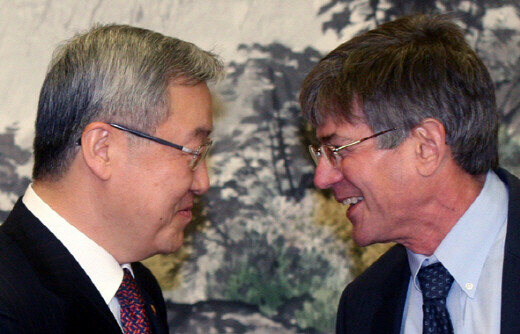hankyoreh
Links to other country sites 다른 나라 사이트 링크
S.Korea officially requests inter-Korean military talks

Yi Yong-in, Staff Writer
The Ministry of National Defense sent a telephone message to North Korea on Wednesday on behalf of Defense Minister Kim Kwan-jin proposing to hold a working-level meeting. The message sent via inter-Korean military communication lines proposed senior-level inter-Korean military talks at the House of Peace in the South Korean section of Panmunjeom at 10 a.m. on Feb. 11. The representative to this meeting is to be at the colonel or general level.
Defense Ministry spokesman Kim Min-seok explained, “The position of the South Korean government is that we can only proceed to the main talks on the assumption that the agenda will include content regarding apologies and responsible measures for the sinking of the Cheonan and the Yeonpyeong Island provocation.”
However, if North Korea dodges the conditions by proposing to discuss all of the issues seriously during the main talks, there is a strong chance that Seoul will provisionally agree to holding those talks.
A government authority said, “For our part, we are not saying we will not hold the main talks, and the fact that the message lumped everything into ‘responsible measures’ rather than specifying ‘apologies’ and ‘punishment of those responsible’ left some margin in that regard.”
Another senior government official said Wednesday, “The Cheonan and Yeonpyeong Island issues are not direct conditions on the track toward the resumption process for the six-party talks on the North Korea nuclear issue.”
Meeting with journalists Wednesday following a meeting with Foreign Minister Kim Sung-hwan and U.S. Deputy Secretary of State James Steinberg, this official said, “The condition with direct bearing on resumption of the six-party talks involves actions to show a genuine intent toward denuclearization.”
On the issue of improved inter-Korean relations as a precondition for resuming the talks, the official clearly differentiated the precondition of improved inter-Korean relations to the resumption of the talks as being “connected with the North Korean nuclear issue.”
These remarks by a senior government official reaffirm Seoul’s existing policy of dealing separately with inter-Korean dialogue on the matters of the Cheonan and Yeonpyeong Island and inter-Korean dialogue within the six-party talks framework to discuss the nuclear issue. However, experts are interpreting them as containing a certain foreshadowing, as they came at a time when the situation on the Korean Peninsula is shifting gradually toward dialogue in the wake of the U.S.-China summit meeting and Seoul is declaring its intent to demand responsible measures from Pyongyang on the Cheonan and Yeonpyeong Island issues through military talks and other means.
To begin with, they give the impression that Seoul is taking the initiative in surmounting the first hurdle toward resuming the six-party talks through “denuclearization talks between North Korea and South Korea.”
Analysts also say another underlying factor is the determination that even if no progress is made with inter-Korean dialogue with regard to the Cheonan and Yeonpyeong Island incidents, it will be possible for Seoul to sidestep charges from the international community that it is “getting in the way of the six-party talks” by holding talks on denuclearization.
The previously quoted official also said that the governments of South Korea and the United States had reaffirmed that the North Korea’s uranium enrichment program (UPT) was in violation of international norms, including a United Nations Security Council resolution sanctioning North Korea and the joint statement of Sept. 19, 2005, and that Seoul planned to continue with discussions toward a response from the international community, including the UNSC.
However, when asked whether Seoul and Washington had decided to reopen discussions on the UEP issue at the UNSC, the official said that it was “not a situation where I can give concrete details on our tactics” and that the U.S. would discuss the issue with China in the future.
However, some observers predict little chance that China will agree to the method of reopening UEP discussions at the UNSC.
At an informal press conference at the Central Government Complex annex on Seoul’s Sejong-no road Wednesday afternoon, Steinberg expressed gratitude for Seoul’s efforts toward dialogue with Pyongyang, including its proposal of a preliminary senior-level military meeting, and said that Washington was highly supportive of Seoul’s efforts and that it would be coordinating closely in all areas.
Please direct questions or comments to [englishhani@hani.co.kr]
Editorial・opinion
![[Column] Is Korean democracy really regressing? [Column] Is Korean democracy really regressing?](https://flexible.img.hani.co.kr/flexible/normal/500/300/imgdb/original/2024/0705/2917201664129137.jpg) [Column] Is Korean democracy really regressing?
[Column] Is Korean democracy really regressing?![[Column] How tragedy pervades weak links in Korean labor [Column] How tragedy pervades weak links in Korean labor](https://flexible.img.hani.co.kr/flexible/normal/500/300/imgdb/original/2024/0703/8717199957128458.jpg) [Column] How tragedy pervades weak links in Korean labor
[Column] How tragedy pervades weak links in Korean labor- [Column] How opposing war became a far-right policy
- [Editorial] Korea needs to adjust diplomatic course in preparation for a Trump comeback
- [Editorial] Silence won’t save Yoon
- [Column] The miscalculations that started the Korean War mustn’t be repeated
- [Correspondent’s column] China-Europe relations tested once more by EV war
- [Correspondent’s column] Who really created the new ‘axis of evil’?
- [Editorial] Exploiting foreign domestic workers won’t solve Korea’s birth rate problem
- [Column] Kim and Putin’s new world order
Most viewed articles
- 110 days of torture: Korean mental patient’s restraints only removed after death
- 2Months after outcry over “torture devices,” Justice Ministry proposes more restraints for immigratio
- 3Beleaguered economy could stymie Japan’s efforts to buoy the yen
- 4[Column] Is Korean democracy really regressing?
- 5Koreans are getting taller, but half of Korean men are now considered obese
- 6[Column] How tragedy pervades weak links in Korean labor
- 7Former bodyguard’s dark tale of marriage to Samsung royalty
- 8Real-life heroes of “A Taxi Driver” pass away without having reunited
- 9[Editorial] Exploiting foreign domestic workers won’t solve Korea’s birth rate problem
- 10Democrats ride wave of 1M signature petition for Yoon to be impeached